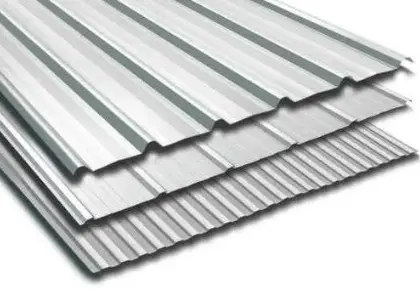When choosing roofing materials, homeowners and builders often compare aluminum roofing sheets and Aluzinc roofing sheets. Both materials are known for durability, corrosion resistance, and long service life, yet they differ in composition, performance, cost, and ideal applications. Understanding the difference between aluminum and Aluzinc roofing sheets will help you select the right option for your climate, budget, and construction needs.
What Are Aluminum Roofing Sheets?
Aluminum roofing sheets are made from pure or alloyed aluminum. They are popular for residential, commercial, and industrial applications because aluminum is lightweight, naturally corrosion-resistant, and easy to install. Since aluminum does not rust, it performs exceptionally well in coastal environments and regions with high humidity.
What Are Aluzinc Roofing Sheets?
Aluzinc roofing sheets are steel sheets coated with an alloy of 55% aluminum, 43.5% zinc, and 1.5% silicon. This coating, often called AZ coating, combines the advantages of aluminum and zinc to create a highly durable and corrosion-resistant surface. Aluzinc is widely known under trade names like Galvalume®, and it is commonly used for roofing, cladding, and structural applications.

Key Differences Between Aluminum and Aluzinc Roofing Sheets
1. Material Composition
-
Aluminum Roofing Sheets: Made of aluminum or aluminum alloy.
-
Aluzinc Roofing Sheets: Steel core coated with an aluminum-zinc-silicon alloy.
The steel core in Aluzinc provides high strength, while aluminum roofing offers natural corrosion resistance.
2. Weight
Aluminum is significantly lighter than steel, making aluminum roofing sheets one of the lightest metal roofing options.
-
Aluminum: Very lightweight, reduces structural load, easy to install.
-
Aluzinc: Heavier than aluminum due to its steel base.
For buildings requiring minimal weight—such as long-span structures or older homes—aluminum may be the better choice.
3. Corrosion Resistance
Both materials resist corrosion, but in different ways.
-
Aluminum Roofing Sheets:
Aluminum forms a natural oxide layer that protects against rust, making it ideal for coastal and marine environments where salt corrosion is a major concern. -
Aluzinc Roofing Sheets:
The aluminum in the coating protects the steel from corrosion, while zinc provides sacrificial protection. Aluzinc performs exceptionally well in normal atmospheric conditions, industrial areas, and hot climates.
However, in extremely salty environments, aluminum still outperforms Aluzinc because steel-based materials can eventually show edge corrosion.
4. Durability and Lifespan
Both roofing types offer long service life:
-
Aluminum Roofing Sheets: 40–70 years depending on thickness and environment.
-
Aluzinc Roofing Sheets: 30–60 years depending on coating thickness and exposure.
Aluzinc provides excellent heat reflectivity and surface hardness, while aluminum maintains superior resistance to moisture and salt.
5. Strength and Structural Performance
-
Aluminum: Softer and more flexible, easier to bend or dent.
-
Aluzinc: Stronger and more rigid due to steel core, better for applications requiring structural performance.
For high-wind regions or areas with heavy rainfall, Aluzinc roofing sheets offer better impact and load resistance.
6. Appearance and Coating Options
Both types come in various profiles such as corrugated, standing seam, and tile profiles.
-
Aluminum: Often used with painted or anodized finishes.
-
Aluzinc: Typically has a distinctive spangled metallic appearance and can also be color-coated with polyester or PVDF paints.
7. Cost Differences
Generally:
-
Aluminum roofing sheets are more expensive due to the higher cost of the raw material.
-
Aluzinc roofing sheets are more affordable and offer a good balance between cost and performance.
For budget-sensitive projects, Aluzinc provides greater value.
Which Roofing Material Should You Choose?
-
Choose Aluminum Roofing Sheets if:
-
You live near the coast
-
You need lightweight roofing
-
Corrosion resistance is your top priority
-
-
Choose Aluzinc Roofing Sheets if:
-
You need high strength and durability
-
You want a cost-effective roofing solution
-
The environment is industrial, hot, or moderately humid
-
Conclusion
The main difference between aluminum and Aluzinc roofing sheets lies in their composition, weight, corrosion resistance, structural performance, and cost. Aluminum excels in coastal climates and lightweight construction, while Aluzinc offers strength, durability, and affordability for a wide range of environments. By understanding these differences, you can choose the roofing material that best fits your building’s needs and long-term performance requirements.
Post time: Nov-28-2025



